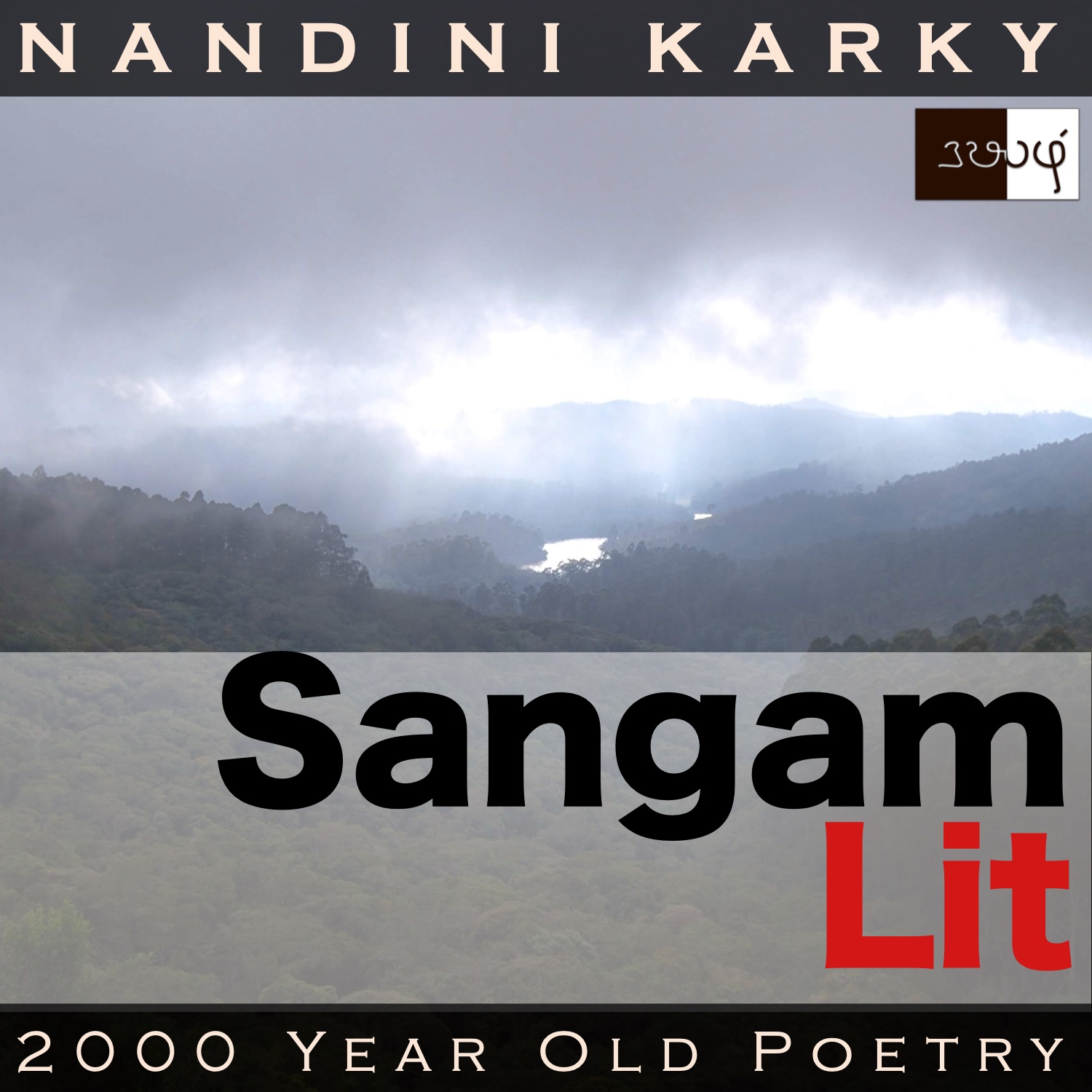Podcast: Play in new window | Download
Subscribe: Apple Podcasts | Spotify | Amazon Music | Android | iHeartRadio | TuneIn | RSS | More

In this episode, we perceive the effect of the man’s plans to part away on the lady, as portrayed in Sangam Literary work, Kurunthogai 76, penned by Killimangalam Kilaar. Set in the hills of ‘Kurinji’, the verse speaks in the voice of the lady to the confidante, conveying that she was already aware of the man’s intention to part away.
காந்தள் வேலி ஓங்கு மலை நல் நாட்டுச்
செல்ப என்பவோ, கல் வரை மார்பர்-
சிலம்பில் சேம்பின் அலங்கல் வள் இலை
பெருங் களிற்றுச் செவியின் மானத் தைஇ,
தண் வரல் வாடை தூக்கும்
கடும் பனி அற்சிரம் நடுங்கு அஞர் உறவே.
Elements in nature and their effect on one’s state of mind echoes in this verse. In the opening words ‘காந்தள் வேலி’, a picturesque scene of ‘flame lily plants, rising as a fence’ appears before our eyes. Then, we glance at a curious epithet for the hero of the verse in ‘கல் வரை மார்பர்’ meaning ‘having a chest like that of the stone-filled mountains’. From the man’s qualities, we yet again turn to nature in ‘சிலம்பில் சேம்பு’ referring to the ‘taro plant growing in the mountain slopes’. The word ‘chembu’ may have rung a bell in the minds of those who have either lived in or experienced the hospitality of the state of Kerala. More about that soon! The phrase ‘பெருங் களிற்றுச் செவி’ refers to the ‘ears of a huge male elephant’. Next, it’s the turn of the weather to make an appearance as can be seen in ‘தண் வரல் வாடை’ meaning ‘moist and cold northerly winds’ and ‘கடும் பனி அற்சிரம்’ referring to ‘the harsh cold season’. Ending with the words ‘நடுங்கு அஞர் உறவே’ meaning ‘leaving to tremble with angst’, the verse brims with emotion and invites us to listen intently.
Flowers, plants, winds and weather seem to leave the speaker with a sense of pain! The context reveals that the man and lady had been leading a happy, married life when the man decided to part away to gather wealth. Instead of expressing it directly to the lady, the man takes the news of his parting to the confidante so that she can gently break it to the lady. When the confidante approaches the lady with the intention of conveying this news, the lady says to her, “They say that he would leave to that fine country with soaring peaks, hedged by flame lilies – He, the one with a chest like a rock-filled mountain! In the mountain slopes, the swaying, fertile leaves of the ‘chembu’, akin to a huge elephant’s ears, are moved by the cool and moist northerly winds in the harsh cold season, and he would be away, leaving me to shiver with suffering!” With these words, the lady informs the confidante that she had already learnt about the man’s imminent departure.
Time to explore the nuanced elements here! Without any further ado, the lady informs her friend that others have told her that the man would leave to the far away mountain country that seemed to be naturally fenced by the glowing red flame-lilies. Then she pauses to describe the man as one, who has a chest akin to rock-filled mountains. When the lady is referring to the man’s stone-like chest, whether she means it, as his strong chest or deep conviction or hard heartedness, is left to the imagination of the listener. From there, she turns to talk about the ‘chembu’ plant growing in the mountains and curiously she places the leaves of these plants in parallel with a male elephant’s ears.
A moment to pause and relish this comparison! When searching for the botanical equivalent of this ‘chembu’ plant, I learnt that it refers to the family of ‘Colocasia’ plants that are found abundantly in various regions of India. Surprise, surprise, one of the common names for the plants of this genus is ‘elephant-ear plant’, which is the exact simile used in this verse. There are edible varieties of this plant and they point to the yam and taro tuber plants. Now, those who have savoured the cuisine of Kerala would find it easier to make the connection, for in the recipe of ‘Chembila curry’, the very leaves mentioned here, is one of the main ingredients. Amazing how the word ‘Chembu’ has lived on for two thousand years and delighted tongues that speak Malayalam, Tamil’s closest sibling, and goes on to highlight the inseparable bond between the two southernmost states of India.
Returning to the verse, we find the lady has mentioned this elephant-eared plant only to say how it will shaken by the cold and moist northerly winds in winter and she relates to how she would be quivering with suffering in that very season when the man parts away. Through that, the lady is hinting to the confidante that her friend must not merely bring news of the man’s departure but should be doing something to prevent the pain that would arise in the man’s parting away. Indeed, it’s fine inner emotions these verses seem to be talking about, and yet, so much of the world outside comes alive before our eyes!




Share your thoughts...